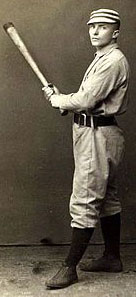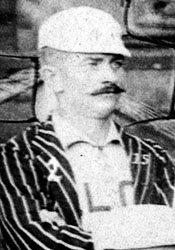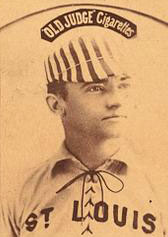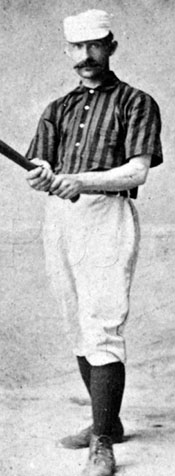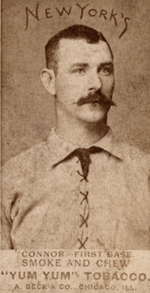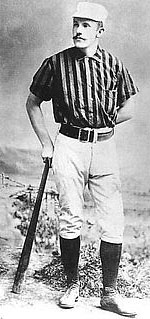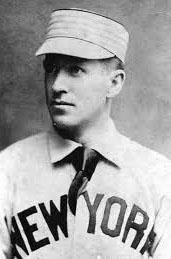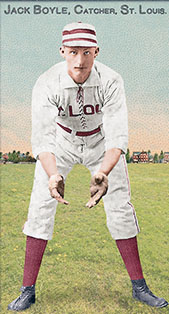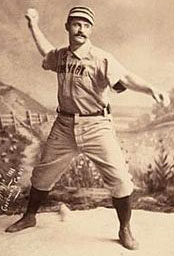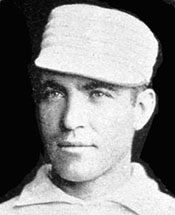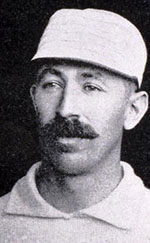|
|
The St. Louis Browns won the American Association championship four straight years from 1885 to 1888.
The Browns became the St. Louis Perfectos in 1899 and the Cardinals in 1900.
Pundits figured 1888 would be the year the Browns would be unseated after three years atop the Association.
But the critics underestimated Comiskey's ability to get the most out of his ball club.
The Browns needed all those top-notch performances to fend off Brooklyn, which improved tremendously with the addition of the three former Browns.
 The Browns faced the National League winning New York Giants in the championship series.
Tuesday, October 16: Game One at Polo Grounds, New York Rain early in the day reduced the crowd to about 5,000 in the Giants' brand new ballpark. Jim Mutrie's ace, Tim Keefe (35-12) outdueled Silver King . Both teams got only three hits, but the home club plated two runs to the visitors' one. The Giants scored in the bottom of the 2nd on a single by 1B Roger Connor, a safe bunt by SS John Ward, a wild pitch, and a fly ball. The Browns evened the score in the top of the 3rd when Latham drew a one-out walk, then stole 2nd and continued to 3rd on a wild throw. A base knock by O'Neill plated the run. King retired the first two batters in the bottom of the inning, one of a "brilliant catch" by McCarthy only to have a carbon copy of the top of the inning take place. RF Mike Tiernan got a base on ball. He set out for 2nd and drew a wild throw from C Jack Boyle that allowed him to come all the way home. Neither team dented the plate after that. 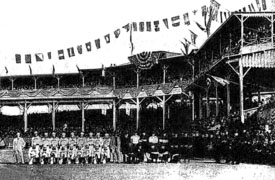 Polo Grounds 1888 Wednesday, October 17: Game Two at Polo Grounds, New York Thursday, October 18: Game Three at Polo Grounds, New York Friday, October 19: Game Four at Washington Park, Brooklyn
Playing the role of the visiting team on the American Association diamond, the Giants knocked Chamberlain around to the tune of eight hits and six runs to cop a 6-3 victory behind Ed Crane, who was only 5-6 for the season. Von der Ahe blamed the defeat on the "muddy grounds."
 Washington Park, Brooklyn Saturday, October 20: Game Five at Polo Grounds, New York
Monday, October 22: Game Six at Philadelphia Baseball GroundsPitching again on one day's rest, the aces faced each other for a third time. The Browns suffered their most disheartening defeat yet as they blew a 4-1 lead in the bottom of the 8th. Held to four hits by King, the Giants erupted with five more, including triples by Ewing and Connor. The rally was aided by a crucial error by White. When the fifth run of the inning crossed the plate, Umpire Gaffney called the game on account of darkness. The Browns jumped in front again, leading 4-0 after three innings. But after plating just a single tally against Chamberlain's curves in the first five frames, the Giants, buoyed by 200 New Yorkers who took the 9 AM train to join the crowd of 5,000, erupted for 11 runs in the next three to win going away, 12-5. Von der Ahe, always looking for an excuse for his team's failure, accused umpires John Kelly and John Gaffney of betting on the Giants. The Browns owner also singled out White for blame. The work of my shortstop could not have been worse. He could neither hold a ball nor bat. When the train carrying the teams and umpires to St. Louis for the rest of the series, the umpires threatened to quit. But as usual, Von der Ahe weaseled out, claiming he had been misquoted.
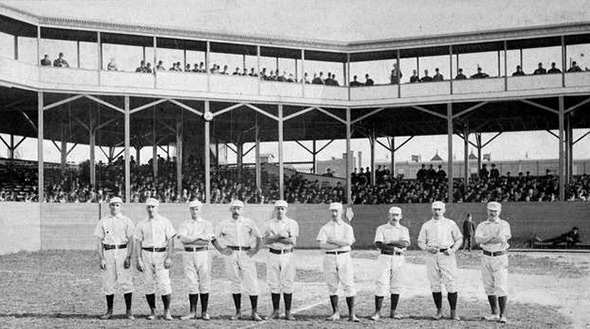 Philadelphia Quakers at their Baseball Grounds After a travel day, the Browns finally won another game to prevent the New Yorkers from clinching the series. They scored four in the bottom of the 8th for a 7-5 triumph before 5,000. Two Giants fell victim to injuries. First, Connor hurt his leg in a collision with King, the winning P. Then C Bill Brown broke his thumb on a foul tip. His replacement, Pat Murphy, couldn't handle Crane's speedy delivery, and the big P was compelled to let up. That's when the Browns started to overcome the 3-0 deficit. Comiskey's triple sparked the winning rally. Thursday, October 25: Game Eight at Sportsman's Park, St. Louis The Giants belted Chamberlain again to win their sixth game and the championship. Leading only 5-3 in the 9th, New York exploded for six runs to win going away. The New York Times report contains this strange passage. Whenever the Giants made a hit or a run or a good stop or executed any of the sensational manuevers usually executed by good ball players, the solemnity of the scene was interrupted by the screeching of horns, the ding-donging of the cowbells, and the triumphant yells of a certain home element that likes to see the Browns go down. Keefe won his fourth game of the series against no losses. Even though New York had clinched the series, Von der Ahe insisted that two more games be played in his home ballpark. With many Giants departing after the clinching victory, including Ward, Ewing, and Keefe, the Browns won two slugfests, 14-11 and 18-7. True to form, sore loser Von der Ahe refused to pay his players after they lost the series and pocketed all the receipts from the series. The embittered Browns' pennant streak finally came to an end in 1889 amid some strange goings-on. At one point, the players threatened to strike. They decided to travel to the next series where they lost three games in a row, all in the late innings. Despite inconsistent play - whatever the cause - St. Louis finished only two games behind pennant-winning Brooklyn.
References: Before They Were Cardinals: Major League Baseball in Nineteenth-Century St. Louis, Jon David Cash (2002) The Spirit of St. Louis: A History of the St. Louis Cardinals and Browns, Peter Golenbock (2000) |
